
10 Content Writing Skills to Succeed and Become a Top Writer?
Writing is the hardest language skill to acquire, especially when you are writing online. Here, you need to be aware of your readers as well as the search engine. On top of that, keeping internet users engaged is way more difficult. Mastering a few content writing skills will help you satisfy both.
Aim at mastering the following skills to succeed:
- Adaptability to different styles
- Research skills
- Maintaining originality
- Good SEO knowledge
- Organizing information
- Creating a strategy
- Staying updated
- Communication skills
- Proofread and editing
- Using Artificial intelligence
These are the essential skills you must have. Additionally, some other skills are needed as well to avoid failure. Let me share my experience of how these skills helped me shine in the industry.
Content Writing Skills to Succeed in 2025
Having adequate language knowledge is not enough to write content that hooks readers and makes them come back again. You have to master the following skills, too.
1. Adaptability to different styles

A major skill to stay relevant in the industry is adaptability. You need to adapt to different styles for different niches. Yes, it is good to be a master or pro in a specific niche, but it limits your potential.
So, what does adaptability refer to? It means shifting your style, tone, and format to resonate with different audiences and platforms. The intent of content is not always the same. Some articles aim at informing the audience, while some may promote a product, and some create awareness through research.
Should they all follow the same pattern?
Obviously, no!
Different genres require you to write differently. Additionally, you have to change your pattern depending on the platform and audience. When you are writing on social media, the tone needs to be more relaxing and entertaining, while on the web, it has to be more informative.
i. Shape Your Format According to the Audience
Who is your audience? Who is going to read it? How old are they, and how do they talk?
Try finding this information to adapt. You need to blend in so that they feel you are one of them, not some alien. It helps to create a bond between you and the reader.
The writing skill that attracts young adults won’t work for the elders. That is why you have to adapt to different styles. Otherwise, you will be stuck to a particular format and may become obsolete over time.
ii. How to Adapt to Different Writing
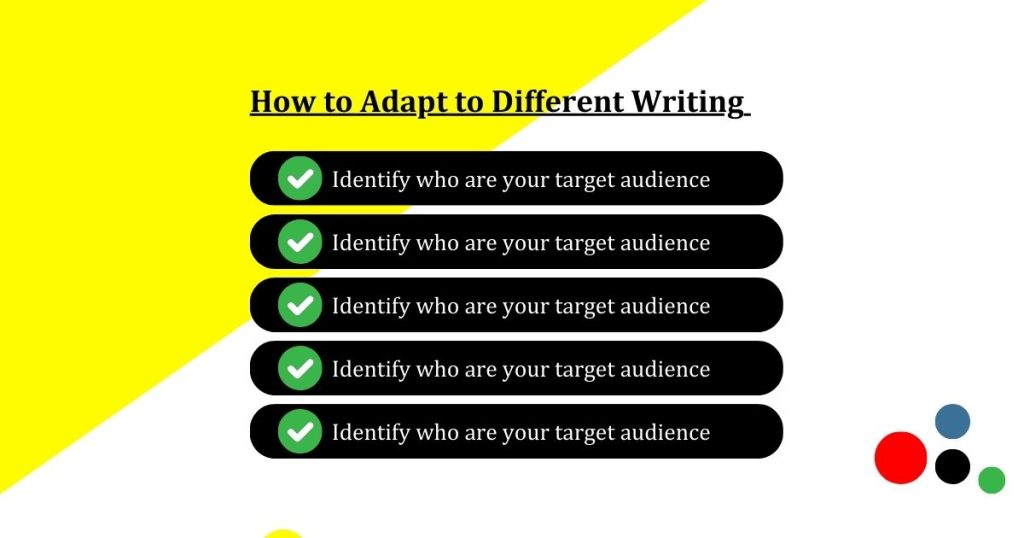
It’s not too difficult to adapt to a new style. The problem is to maintain a balance as you may have to switch back and forth between different styles. I follow these tips to ensure I am up-to-date with the trends.
- Understand your audience deeply. Get insights about their behavior, likes and dislikes, and interests.
- Try to blend different tones in a balanced amount. Let your content have a little humor and persuasiveness, or it may be serious if needed. Study words to find out which words suit the situation.
- Read others’ articles. I do this all the time. The more I read others, the better I understand the flaws and strengths of my writing. This helps me come up with a better version. Hopefully, it will work for you, too.
2. Research skills
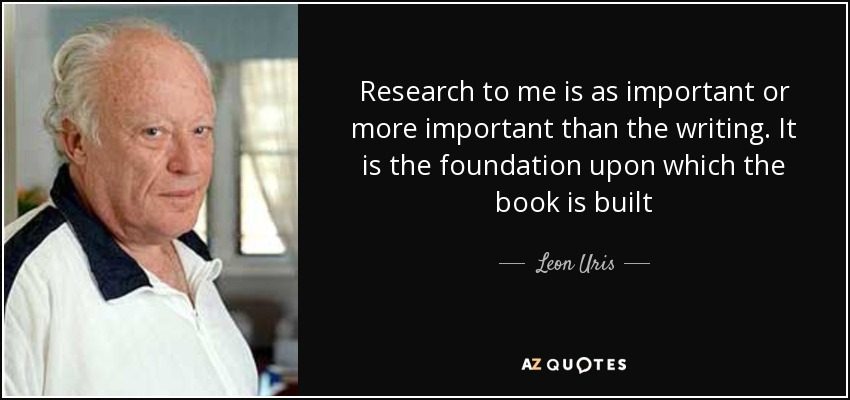
Research is the primary condition of crafting good content. Unless you have done an excellent job in research, the content won’t satisfy the users.
You need to provide the most updated information to your audience. Why would Google or any other search engine care to display your content that adds no value and all it has are age-old information?
i. A Common Research Error
This is 2024, and you cannot follow the tricks that worked in 2015. Back then, we used to gain information from our competitors. Let me make it clear with an example:
Let’s say I am about to write content on the evolution of technology. The first thing I had to do is Google it. Google shows me some of the best content, and now all I have to do is read them and rewrite them. Maybe add more information by mixing information from 5 to 6 articles.
That does not work in 2024!
The content has to be unique. Unique in the sense that it has something that did not already exist on the web. Otherwise, Google will not be fooled by those cheap tactics anymore.
ii. How to Do Proper Research?
After some experimentation, I have come up with the following research method that is working fine for me. Here is what I do:
- Understand the topic and keyword. Place yourself in the position of the reader. What information would you want from such an article? Note them down.
- Now, check some relevant forums. For example, you are writing, “Can turtles eat green apples?” Check relevant forums, see what experience people are sharing, and take notes.
- Read research papers and journals. Researchgate, Academia, and NIH are some free websites where you will find thousands of journals to read for free. For specific niches, you will find other government and authoritative websites to find information.
- Watch YouTube videos. Let’s say you are writing on “How to change the coolant in Toyota Camry.” Watching a video will provide you with a better understanding than only reading articles.
- Now, for the final step, check your competitors. Have they added any information that you have not? Steal them. C’mon, this is what we call stealing like an artist.
3. Maintaining originality
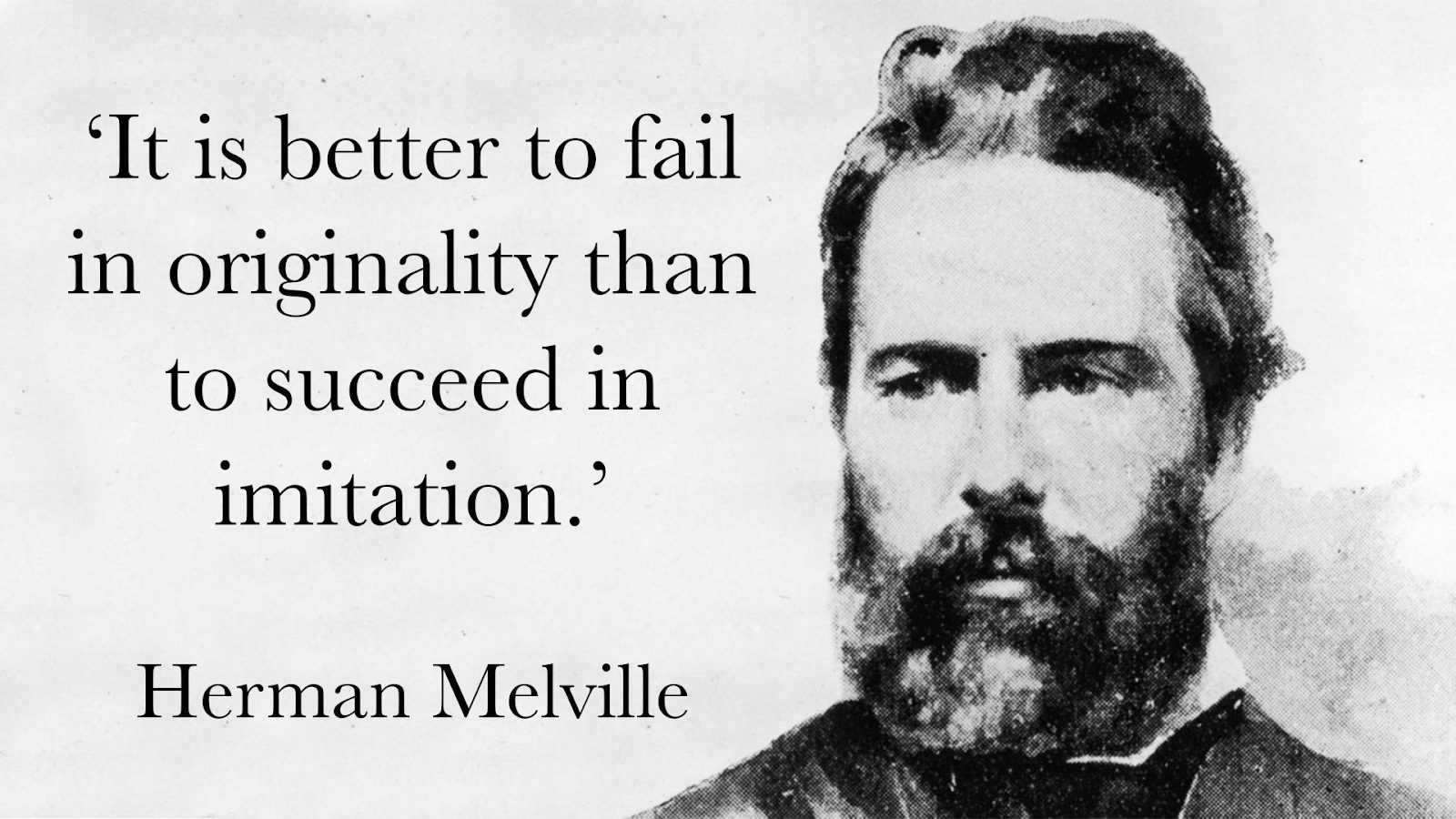
Perhaps Google has taken it a bit too seriously these days. And I have already given you a hint about this in the previous point.
Originality is not only writing plagiarism-free content.
There has to be something new in your content that makes it more informative. Of course, you cannot make new information out of thin air, nor can you start doing field research yourself. What is the solution, then?
Find out what your competitors are missing. Are they missing nothing? Then, look at what could make it even better. Let me share one of my experiences.
I was writing, “Can bearded dragons eat pineapples?” My competitors already mentioned the reasons, benefits, and risks. But I figured out that they did not mention the nutritional value of pineapples. I added a chart of the fruit’s nutrition profile and then discussed depending on the nutritional value.
Result? My article soon reached the top of the SERP.
Moral: Originality matters! You see, I did not discover the nutritional value. All I had to do was organize my content to make it more informative. It was not that difficult, was it?
4. Good SEO knowledge
“The best SEO strategy is to focus on the user.” – Marcus Tober.
Many people think that SEO is all about the search engine. Perhaps it was back in the early days when SEO was a messed up industry. However, SEO is now more organized than ever, and it prioritizes user experience.
i. Why Do You Need to Know SEO?
“SEO is not my job, my task is to create content.” Is that what you think? If so, make a change in your perspective. One of the primary reasons many people have failed as writers is their lack of knowledge of SEO.
You don’t have to be an expert. No, I am not saying that. Nonetheless, basic knowledge is a huge plus for writers. Here is why:
- When a writer can implement on-page SEO, it makes the job of SEO experts much easier.
- By understanding SEO, you can tailor your content to relevant keywords. It makes it more likely to appear in search results in higher rank.
- SEO prioritizes user experience. In other words, when you are aiming for SEO, you are indirectly working on improving user experience.
- SEO helps you identify what information users are truly looking for when they search for certain terms. This ensures your content directly addresses their needs and pinpoints them. It leads to a more valuable and satisfying experience.
- You get to know your target audience better through SEO and adapt to the style that draws their attention.
ii. SEO Practices You Should Implement
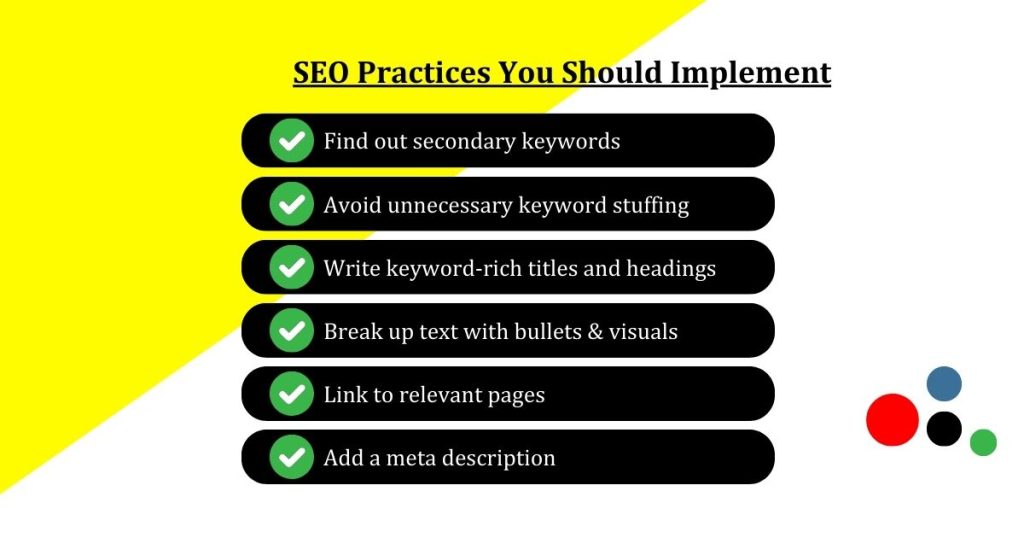
Here are some of the crucial SEO practices you must follow so that your content aligns with SEO content.
- Find out some secondary keywords related to the main keyword.
- Avoid unnecessary keyword stuffing to prioritize user experience over keyword density.
- Craft clear and keyword-rich titles and headings. They will guide readers and search engines through the content.
- Break up text with easy-to-digest paragraphs and bullet points for improved readability. Did you notice that I am also using bullet points here and there?
- Link to relevant pages on your website to improve user navigation and SEO.
- Add a compelling meta description that summarizes your content.
5. Organizing information
The organization of information is as important as giving information. Serving information will not benefit the readers if it is not organized. Organizing information means to present information in the right order.
i. Importance of Organizing Information
In SEO content writing, clear organization is often called the x factor. Search Engines like well-structured content as it helps them understand your message and deliver it to the right searchers. Here is how it benefits SEO:
- Readers can easily find the information they need. It boosts engagement and time spent on your site, which is a positive SEO signal.
- Search engines crawl your content, and a clear structure helps them follow your points and grasp the overall topic.
ii. How to Organize Information in Your Content?

Organizing your content requires some pre-work before you start writing. Here are the things that I personally always prefer to do:
- Create an outline first. This will help you organize them in the correct order. Break down your topic into main points and sub-points. This creates a logical flow.
- For stories or historical topics, a timeline approach works well.
- Many searches have the intent to solve a problem. Frame your content around presenting the issue and then offering solutions.
- Divide your content into sections with clear and concise headings. Use relevant keywords here.
- Break down complex information or highlight key takeaways for easy digestion.
- Use phrases and sentences to connect ideas and guide readers through your content. And yes, bullet points always work fine while giving instructions.
- Add charts, graphs, and images to enhance understanding and break up text. Plan them before starting to write. This will help your graphics designer while making the pictures.
6. Understanding the Brand Voice

Understanding a brand voice is an important skill for succeeding as a content writer. When you are writing, often you are writing for a brand. Each brand is unique in its own way. Your writing should reflect this uniqueness. A brand can become bigger through good content.
Understanding a brand voice helps you create effective content in the following ways:
- Think of the brand as a person. What’s their tone? Friendly and approachable, or sophisticated and authoritative? Understanding this voice ensures your writing reflects the brand’s personality in your words.
- What does the brand stand for? What problems do they solve? Aligning your content with the brand’s core values creates a sense of consistency.
- Who are they trying to reach? Understanding the brand’s ideal customer allows you to tailor your content’s language, style, and message to effectively connect with them.
7. Staying updated
Update your knowledge, and you won’t be outmoded.– Israelmore Ayivor
You must remember this quote. This summarizes an important skill for you. Every profession demands you to update yourself with time. You cannot be the same. Think of a doctor. He has to know about newer medicines and newer disease symptoms. The same is true for a content writer as well.
Perhaps this is the most common reason for which many content writers fail. They do not update or upgrade themselves. You cannot be the same as a writer you were a month ago. No, not in the world of the internet. If you have not improved, then you must have decayed.
i. Why Do You Need to Learn Regularly?

To stay relevant. That is it. You have to learn new things and newer approaches and do experiments to come up with newer methods. People’s tastes change, trends change, and have to be your writing.
- The digital landscape is constantly changing. New technologies emerge, industries adapt, and audience preferences shift. Regular learning ensures your content stays relevant and reflects current trends.
- The content creation world is vast. By actively learning new skills like SEO optimization or different content formats, you expand your toolbox and become a more valuable asset to clients.
- Continuous learning can open doors to exciting new niches. Maybe you discover a passion for a specific topic or industry. By expanding your knowledge base, you can target content toward these areas and become a subject matter expert.
- The best writers are always honing their craft. Learning new writing techniques, exploring diverse writing styles, and studying grammar can elevate your content’s quality.
- Learning is a great way to keep your creative juices flowing. Exploring new ideas, researching diverse topics, and engaging with other content creators can spark inspiration and prevent creative burnout.
ii. How to Stay Updated as A Content Writer?

If you ask me, I would say it is not very difficult to stay updated. All you have to do is keep in touch with others. Read other’s blog articles and see what new things they are doing.
If you are new in the industry, then you must follow those who are proven experts. You definitely have a lot of things to learn from them.
Google often comes with newer updates. Other search engines do the same as well. Their algorithm behaves slightly differently after the new updates. You have to crack the changes. Discover what works best for the new updates. This way, you will be able to stay on top of the industry.
Force yourself to experiment. Learning the newer trends is not difficult. Keeping your eyes and ears is enough. Let’s say you are a good sports content writer.
However, recently, the metaverse has been on the rise. This is a new niche that you have not worked before. To stay updated, you should at least check what they are doing and how the contents are being written by the writers. Then, if you ever need help, you can also work on these niches.
8. Communication skills
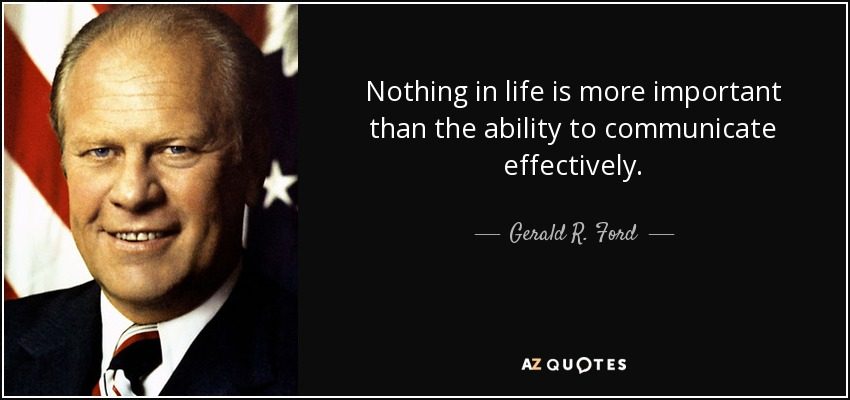
If the president himself said so, then what argument can we have on this? We all know how important it is but still ignore this, especially writers. Communication is not limited to verbal communication only.
You need to understand how people understand and grasp communication. Only then can you create content that communicates with your audience? Otherwise, it just fails.
i. Importance of Communication in the Content Writing Industry
Communication skills are the lifeblood of content writing service. They form the bridge between your ideas and your audience. I could use hundreds of other metaphors, but let’s come to the facts.
- Clarity and Understanding: Effective communication starts with clear and concise writing. You want readers to grasp your message effortlessly. Strong communication skills allow you to express complex ideas in a way that’s easy to understand.
- Targeting the Right Audience: Content writers don’t write in a vacuum. They tailor their message to a specific audience. Keen communication skills enable you to understand your target audience’s needs, interests, and pain points.
- Compelling Storytelling: Great content doesn’t just inform, it captivates. Strong communication skills empower you to weave narratives and craft compelling stories that hold readers’ attention. Why are you still reading this article? because I am talking to you, making conversation with you, and communicating with you.
- The Art of Persuasion: Many content pieces aim to persuade readers to take action. Communication skills equip you with the tools to craft persuasive arguments and call to action. You can effectively present your message in a way that resonates with readers and motivates them to act.
- Building Trust and Credibility: Clear and consistent communication builds trust with your audience. Readers appreciate content that’s well-written, informative, and free of errors. Strong communication skills allow you to establish yourself as a reliable source of information.
ii. How to Communicate with the Audience?

The secret to having effective communication through writing is understanding your readers. Once you know them, keep in mind the following tactics.
- Think of your audience as a human being, only one human being. Address him in the way you think would attract his attention. If you want to target thousands of people at a time, you will end up talking to none.
- Don’t jump into the facts from the first sentence. Don’t keep them waiting for too long before telling them the facts. What I mean is that you need to give a start that makes them believe in you. Let them believe that you have the solution; you are the man to trust.
- Engage them with questions. Let them also think while reading your content. This way, they will be engaged and involved.
- Draw readers in by using strong verbs and putting them in the center of the action.
- Weave narratives and anecdotes to illustrate points and make your content memorable.
- Foster a two-way conversation. Show your audience you value their engagement.
9. Proofread and editing

Never submit your first draft, as it can never be the best version of your work. It requires proofreading and editing. Read it once, twice, and several times. Each time, your inner self might want to make some changes. Go on!
You must not be afraid of striking a few lines. Some words may sound awful or mismatched. You may want to change the same thing the second time as well. It is absolutely fine.
i. What Is Proofreading?
Proofreading is not just reading your article. While reading, you must double-check the important information. Let’s say you used a reference to increase the value of your content. Check if the link is working or if you have used the correct link. Additionally, you should also look for these issues:
- Spelling mistakes
- Grammatical errors
- Formatting
- Style and tone of writing
- Formatting
- Language consistency throughout the content
ii. Why Is Proofreading Important for Content Writers?
There is a reason why experts consider proofreading to be a vital content writing skill.
- Proofreading ensures your content is free of typos and grammatical errors. Hence, it appears more professional and polished.
- It helps to catch mistakes that can alter your intended meaning.
- Error-free content builds trust and establishes you as a reliable authority in your field.
- Shows you care about the quality of your work and value your audience’s time.
- While editing and proofreading, you may often come up with newer ideas to add to the content.
- Proofreading helps you continue writing when you are stuck in the middle of content. I often read the article again and again if I am at a loss as to what to add next in the content.
iii. Tips for Effective Proofreading and Editing
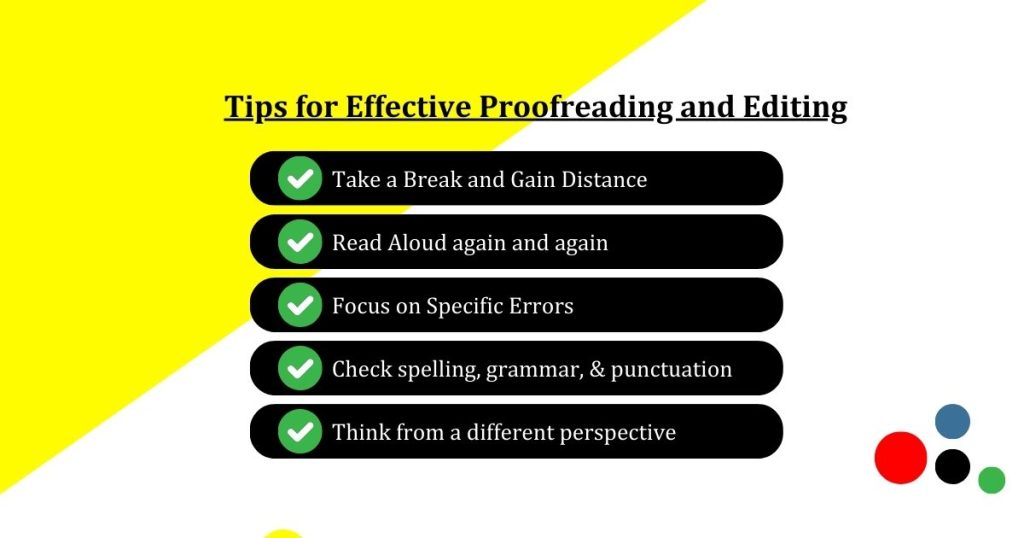
Did you know some companies hire professional editors? And they get paid more than the writers. It shows that editing and proofreading have great value in the industry.
Proofreading your own content will help you become a better editor someday. Here are three effective tips on effective editing and proofreading.
a. Take a Break and Gain Distance
Don’t proofread right after you finish writing. Stepping away for a few hours to return with fresh eyes. This mental break helps you see your work more objectively and catch errors you might have glossed over in the writing flow.
Besides, proofreading right after finishing work does not bring good results. If you read now, you will read as the writer. You may overlook errors like “ocuring” and “occapassion,” as you would think you have written them correctly. With fresh eyes, you would be able to pinpoint them.
b. Read Aloud for a Different Perspective
Reading your work aloud forces you to slow down and pay attention to the sound and rhythm of your sentences. Sometimes, some words don’t go together very well. You can catch them better when reading aloud.
Hearing your writing can also highlight unclear sentence structure and flow. It’s like giving your eyes a break and using your ears. Content that satisfies both eyes and ears surely should be good content.
c. Focus on Specific Errors One Pass at a Time
I suggest you read and revise an article more than once. The more, the merrier. Don’t try to catch all the errors at once. Instead, dedicate each proofreading pass to a specific type of error.
For example, does one pass solely focused on grammar and mechanics? Then, do another pass targeting typos and spelling mistakes. Finally, dedicate a pass to checking for clarity, flow, and word choice. This segmented approach allows you to concentrate on specific details.
10. Using Artificial intelligence

In recent years, AI has boomed! It has been there for quite some time, but the buzz is really loud now. The industry has been divided into two groups. One embraces the new technology, while the other detests it.
I prefer to stay in the middle ground. Taking advantage of AI is beneficial, but being dependent on it is a mistake. If you swear never to get help from AI, you may fall far behind.
i. Why You Should Gain AI Skills
Mastering AI tools can be beneficial for you in a number of ways. Here is how:
- AI tools can generate outlines, draft content, and fact-check. This can free up time for you to focus on strategy and creative aspects.
- AI can suggest content ideas and overcome creative roadblocks.
- You must have heard of Grammarly. It is also an AI tool. Such tools help you check grammar and plagiarism to ensure your content is polished and original.
- The research process can be done more quickly with artificial intelligence. Additionally, it can help you in understanding your audience.
ii. The Best Way to Use AI Tools
The key to using AI content tools effectively lies in viewing them as assistants, not replacements. You must not use them as the primary source of information. Additionally, you need to do fact chat and write on your own. Let AI be your writing partner, not your only weapon.
Conclusion
Becoming a content writer is not easy, but it is not too difficult either. You need to follow a system approach to master the above-mentioned content writing skills. Thus, you can be a successful content writer without failing to sustain in the long run.
Reference:
https://www.indeed.com/career-advice/resumes-cover-letters/content-writer-skills
https://www.simplilearn.com/how-to-become-content-writer-article
